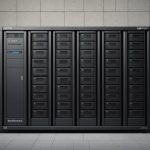Influence of UK Computing Hardware Components on Data Processing Speed
Understanding the impact of UK computing hardware on data processing speed requires examining key components: CPUs, RAM, storage types, and GPUs. The CPU performance dictates how quickly instructions are carried out. For instance, modern UK systems favor multi-core processors that enhance multitasking and complex computations. Meanwhile, RAM capacity supports faster data access by temporarily holding active data and instructions. UK users often choose higher RAM to prevent bottlenecks during intensive tasks.
Storage plays a critical role. The transition from HDD to SSD significantly improves data read/write speeds. SSDs reduce latency, speeding up boot times and application loading, which directly enhances overall data processing speed. Additionally, GPU acceleration is becoming prevalent across the UK, especially in sectors like gaming and AI research. GPUs handle parallel processing tasks, offloading work from CPUs to boost efficiency.
Also read : How Does Emerging Hardware Technology in the UK Affect Data Privacy?
Selecting hardware strategically optimizes performance. UK hardware buyers balance cost with requirements to maximize throughput. Knowing how CPU performance, RAM capacity, and storage type interact helps tailor systems that efficiently handle data loads, ensuring faster and more reliable computing tailored to UK demands.
Influence of UK Computing Hardware Components on Data Processing Speed
Understanding the impact of key UK computing hardware components on data processing speed is essential for optimizing system performance. Central to this are the CPU performance, RAM capacity, storage types such as SSD vs HDD, and the role of GPU acceleration.
Additional reading : Ultimate guide to building a secure vpn server on your raspberry pi for safe and reliable remote access
The CPU acts as the brain, with faster clock speeds and higher core counts directly enhancing data throughput. In typical UK computing systems, modern multi-core CPUs from leading manufacturers are predominant, designed to handle multitasking and complex calculations efficiently.
RAM capacity influences how much data can be held ready for immediate processing. Insufficient RAM can cause frequent data swapping with slower storage, reducing processing speed notably. Most UK configurations now favor at least 8GB to 16GB to balance cost and performance.
Storage speed differences between SSDs and traditional HDDs are pronounced. SSDs offer quicker read/write speeds, drastically cutting load times and improving overall data handling speed, an attribute crucial for data-intensive UK applications.
GPU acceleration offloads specific processing tasks, such as parallel computations, from the CPU. In sectors like finance or media in the UK, leveraging GPUs results in substantial speed gains, making hardware selection a critical consideration for maximizing processing efficiency.
Performance Comparison of Common Hardware in UK Markets
Understanding hardware benchmarks UK is essential to compare the performance of components commonly used in the UK. For CPUs, newer generations offer substantial gains. For example, transitioning from older Intel or AMD processors to the latest models improves CPU performance significantly. This generational upgrade typically results in higher clock speeds, more efficient architectures, and better multi-core performance, directly boosting data processing speed.
UK systems often show difference in RAM performance as well; DDR5 RAM provides faster speeds and improved power efficiency compared to DDR4. This acceleration enhances workflows that depend heavily on memory bandwidth. Storage comparisons between SSD vs HDD show SSDs dominate UK markets not only for faster startup and load times but also due to improved reliability and lower latency.
GPU benchmarks reveal that while consumer GPUs in the UK focus on gaming, business and enterprise sectors rely on GPUs with parallel processing abilities enhancing data-heavy tasks. These distinctions highlight how GPU acceleration impacts data throughput differently according to sector needs.
Thus, UK buyers assess hardware performance via benchmarks considering CPU generational improvements, RAM speed (UK-specific specifications), and storage type, tailoring choices to both budget and required processing speed.
Performance Comparison of Common Hardware in UK Markets
When evaluating hardware benchmarks UK, understanding differences across CPUs, RAM, storage, and GPUs is essential. Recent UK market data shows that upgrading from older to newer CPU generations significantly boosts CPU performance. For example, shifting from 8th to 12th generation Intel processors often yields 20-30% faster data processing, especially in multi-threaded tasks common in UK applications.
RAM speed UK also impacts overall system responsiveness. DDR5 RAM, increasingly adopted in the UK, offers notably higher bandwidth and lower latency compared to DDR4, improving data handling speed in memory-intensive workloads. However, the cost difference prompts many UK buyers to weigh price versus performance benefits carefully.
For storage, the gap between SATA SSDs and NVMe SSDs is pronounced within storage performance metrics. NVMe drives deliver much faster read/write speeds, thereby reducing bottlenecks during large file transfers or database querying – vital for UK business systems.
GPU benchmarks reveal that UK consumers benefit substantially from models optimized for parallel processing tasks. Upgrading GPUs in fields like media production accelerates rendering, which directly enhances data throughput. Importantly, consumer, business, and enterprise hardware show wide disparities, emphasizing the need for UK buyers to align hardware choice with specific performance requirements and workloads.
Influence of UK Computing Hardware Components on Data Processing Speed
In UK computing hardware, CPU performance remains pivotal for fast data processing speed. Modern systems typically use multi-core processors with high clock speeds, enabling efficient multitasking and rapid instruction execution. The CPU’s architecture and generation significantly impact throughput, so UK buyers often prioritize newer models to maximize efficiency.
RAM capacity is equally crucial. Insufficient RAM forces reliance on slower storage, causing bottlenecks that degrade data processing speed. In UK configurations, 8GB to 16GB RAM is common, balancing cost and performance to ensure smooth handling of active data sets without frequent swapping.
Storage type strongly affects speed differences, with the SSD vs HDD debate highlighting SSDs’ superiority in latency and read/write speeds. SSDs accelerate boot times and data access, crucial for UK applications demanding quick responses and large file manipulations.
Furthermore, GPU acceleration augments data processing by offloading parallelizable tasks from the CPU. UK industries such as gaming, finance, and AI benefit from GPUs’ ability to handle complex calculations simultaneously, directly enhancing overall system speed. Selecting an optimal combination of these components is essential for optimizing UK computing hardware performance and achieving high data processing speeds.
UK-Specific Technological Trends and Standards
In the UK, adherence to UK technology standards profoundly shapes hardware choices and performance outcomes. Energy efficiency standards UK imposes strict limits, encouraging adoption of components that balance power consumption with processing capabilities. For example, modern CPUs and GPUs available locally often comply with stringent energy benchmarks, which helps reduce operational costs while maintaining high data processing speed.
Local supply chains influence availability and lead times for UK computing hardware. Suppliers prioritise hardware conforming to domestic compliance regulations, including electromagnetic interference and safety certifications. Such standards ensure components perform reliably under UK environmental and legal conditions, fostering trust among buyers prioritising durable, compliant systems.
Emerging hardware trends UK-wise show a shift towards greener, more power-efficient components, including SSDs that consume less energy than HDDs. The emphasis on environmental compliance is coupled with performance demands, especially in sectors like finance and government, where regulations mandate both compliance and robust processing power.
Understanding how hardware trends UK intersect with local regulations helps users and organisations select devices that are not only performant but also sustainable and compliant, guaranteeing optimal system integration and longevity in the UK market context.
Influence of UK Computing Hardware Components on Data Processing Speed
In UK computing hardware, CPU performance is central to enhancing data processing speed. High clock speeds and multiple cores enable faster execution of instructions, critical for UK users requiring efficient multitasking and computational power. Modern UK systems prioritize newer CPU generations, which optimize processing throughput and energy use.
RAM capacity directly influences data processing by allowing more immediate data access. When RAM is insufficient, systems resort to slower storage media, significantly reducing speeds. UK configurations commonly range from 8GB to 16GB, striking a balance between cost and performance for smoother handling of large datasets and applications.
Storage choices between SSD vs HDD heavily impact processing speeds. SSDs, prevalent in UK setups, offer much lower latency and higher read/write speeds than HDDs. This difference shortens load times and accelerates data-intensive functions, benefiting sectors from business analytics to media production.
Furthermore, GPU acceleration delivers critical performance boosts by tackling parallel processing tasks. UK industries utilizing AI, gaming, or finance increasingly rely on GPUs to offload work from CPUs, thereby enhancing overall data throughput. Properly selecting these components tailors UK computing hardware for optimal and sustained data processing speed.




